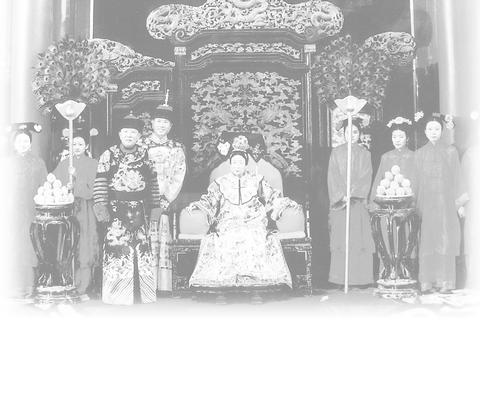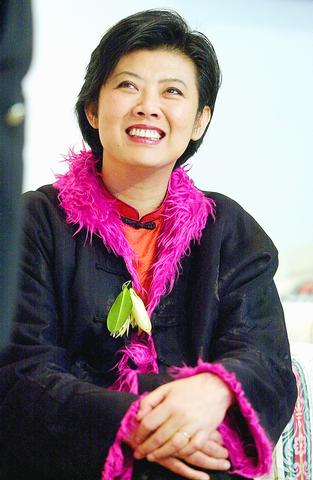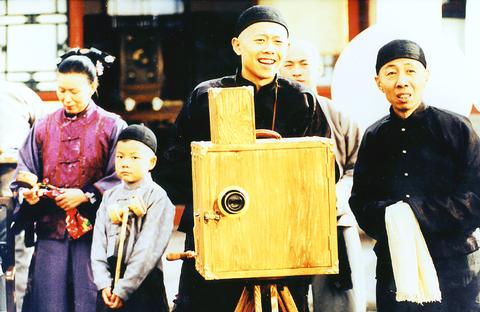Ann Hu (胡安) looks the picture of success, self-assurance and chic in her black embroidered Chinese-style cotton-padded jacket, with a fluffy pink collar. "After so many years living in America, after so much hardship, I didn't want to be just an American business woman," she said, explaining her move from an executive position with a Wall Street firm to becoming an independent filmmaker.
Her move from one high risk profession to another has been rewarded with the considerable success that has greeted the release of Shadow Magic (西洋鏡), her first feature film. The East-meets-West drama about the roots of cinema in China at the turn of the last century has received rave reviews at film festivals throughout Asia, being selected for the competition category at the Tokyo International Film Festival last November, and winning two Golden Horse Awards (金馬獎) from among its seven nominations. In China, the film was the second highest grossing movie last year.

After several years as an executive at a high-power New York multinational firm, Hu's career took an abrupt turn in 1987 when she met director Chen Kai-ge (陳凱歌), maker of Farewell My Concubine, who was then a visiting scholar at her alma mater New York University. The then wildly famous director exposed her to new forms of expression that she had previously ignored, engrossed as she was in the world of business.

PHOTO: CHEN CHENG-CHANG, TAIPEI TIMES
Three years after Hu first met Chen, she engaged in deep artistic soul searching in 1990, trying her hand at writing, painting and photography. Then, after a two-month course at the NYU film school, she settled on filmmaking as her chosen mode of expression.
One of the pivotal events of her decision to become a filmmaker was a chat with Chen in which the director described a scene that he wished to shoot. He depicted the scene in this way: somewhere in Sha'anxi Province (陜西省), the Yellow River narrows at a bend to the width of the spout of a teapot. At this point, the water becomes a torrent. On the riverbank, in sight of this torrent, is a food stand that sells noodles topped with chili. When hot oil is poured over the noodles, the whole dish sizzles. The person who dares make the first crossing at this dangerous bend for a bowl of noodles wins the respect of all.

PHOTO: COURTESY OF CMPC
For Hu, the excitement of this scene was something she could not get out of her mind. "From the excitement I felt [about this scene], I knew I'd found the thing I wanted to do," she said. As it turns out, the scene appears in Chen's Life On A String (邊走邊唱), shot in 1991.
Spanning the divide
Dealing with cross-cultural themes, as Shadow Magic does, seems an obvious course for Hu's movies to take, given her experience as a Chinese-American. Despite its historical subject matter -- looking at the introduction of motion pictures to China in 1906 -- there is also a sub-drama about the mixture of curiosity and resistance that imperial China felt toward encroaching Western powers and culture.
Jared Harris, who starred in Chinese Box (1997) and I Shot Andy Warhol (1996), plays English filmmaker Raymond Wallace who brings his silent films to Beijing. He meets a photographer named Liu Zhonglun (劉京倫) -- played by Xia Yu (夏雨) -- who becomes Wallace's collaborator in the former's ambition to promote cinema, called "shadow magic" by the conservative and deeply suspicious Chinese public. Liu brings trouble and hostility upon himself and sets up obstacles to love by ignoring the objections of his father and his boss toward his dabbling with the "Western stuff" of movies.
"I intend to emphasize the kind of conflicts that occur when two cultures meet," Hu said. She does this with an eye for detail and a light humor, especially in recording the astonished responses of people seeing "shadow magic" for the first time, and in creating the awkward dialogues between Liu and Wallace.
In speaking about Shadow Magic, Hu says she takes special care in balancing the film culturally. "I would not want to make a film just for Chinese or just for American audiences. If I make a film, it is always for people of both places and cultures. And if either the [Chinese or the US audience] cannot be persuaded by my work, it would be a great loss for me," Hu said.
Finding her own way
"In the business world, you can deal with both Chinese and Americans. But as an artist, you have to have a strong [personal] identity," she said. "For me, it is a new identity. I have a solid Chinese heritage and cultural background, but I was nurtured on Western values and working methods." It is Ann Hu's own identity, she said, that drives her to work toward the internationalization of Chinese films.
"This is an inevitable trend, and there will be more and more people like me," Hu said. "More and more Chinese films will have international funding and subjects. They will also have international production and distribution."
"We already have Ang Lee (李安) [from Taiwan] and John Woo (吳穻森) [from Hong Kong]. China should also have one or two filmmakers of such quality," she said.
As for its production, Shadow Magic is also an international mixture. It was financed and produced by Hu's US-based C&A Production, Germany's Road Movies Production, Taiwan's Central Motion Picture Corporation (中央電影公司, CMPC), and Beijing Film Studio (北京製片廠) from China. A former partner of Hu's, Trends Technology, known for its anti-virus software PC-cillin, also invested in the film.
"During the shoot, my American cameraman and Chinese crews were constantly arguing and complaining to me about each other; and the worst was what they said about me behind my back, `the director has no idea what she's doing!' they'd say."
Luckily, with the success of Shadow Magic, the bad feelings have dissipated. Currently Hu has eight projects to consider, including two English scripts and a planned biographical movie about forensic scientist Henry Lee (李昌鈺), who made his name during the O.J. Simpson case. Taiwan's CMPC is expected to be a main investor in these new films.
"Actually, what I really want to do next is an extremely violent and pornographic film," Hu said. Clearly, success and acceptance have done nothing to diminish her ambition to take risks.
For your information
Shadow Magic will be released in Taiwan on Feb. 24. An English subtitled version will be shown at Taipei's Majestic Theater.

On April 26, The Lancet published a letter from two doctors at Taichung-based China Medical University Hospital (CMUH) warning that “Taiwan’s Health Care System is on the Brink of Collapse.” The authors said that “Years of policy inaction and mismanagement of resources have led to the National Health Insurance system operating under unsustainable conditions.” The pushback was immediate. Errors in the paper were quickly identified and publicized, to discredit the authors (the hospital apologized). CNA reported that CMUH said the letter described Taiwan in 2021 as having 62 nurses per 10,000 people, when the correct number was 78 nurses per 10,000

As we live longer, our risk of cognitive impairment is increasing. How can we delay the onset of symptoms? Do we have to give up every indulgence or can small changes make a difference? We asked neurologists for tips on how to keep our brains healthy for life. TAKE CARE OF YOUR HEALTH “All of the sensible things that apply to bodily health apply to brain health,” says Suzanne O’Sullivan, a consultant in neurology at the National Hospital for Neurology and Neurosurgery in London, and the author of The Age of Diagnosis. “When you’re 20, you can get away with absolute

May 5 to May 11 What started out as friction between Taiwanese students at Taichung First High School and a Japanese head cook escalated dramatically over the first two weeks of May 1927. It began on April 30 when the cook’s wife knew that lotus starch used in that night’s dinner had rat feces in it, but failed to inform staff until the meal was already prepared. The students believed that her silence was intentional, and filed a complaint. The school’s Japanese administrators sided with the cook’s family, dismissing the students as troublemakers and clamping down on their freedoms — with

As Donald Trump’s executive order in March led to the shuttering of Voice of America (VOA) — the global broadcaster whose roots date back to the fight against Nazi propaganda — he quickly attracted support from figures not used to aligning themselves with any US administration. Trump had ordered the US Agency for Global Media, the federal agency that funds VOA and other groups promoting independent journalism overseas, to be “eliminated to the maximum extent consistent with applicable law.” The decision suddenly halted programming in 49 languages to more than 425 million people. In Moscow, Margarita Simonyan, the hardline editor-in-chief of the